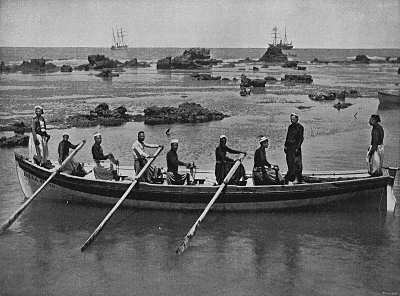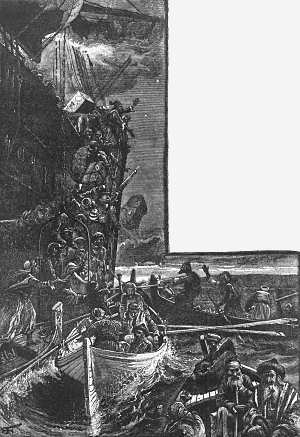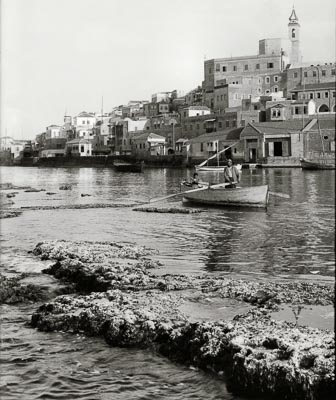
Travel by Sea

Source: Earthly Footsteps of the Man of Galilee, p. 264
Boat and Oarsmen, Jaffa
We were assured that the voyage from Jaffa to Haifa by sea would not occupy more than eight or ten hours, and as we were extremely anxious to arrive there as quickly as possible, my brother made arrangements with the owner of a little Arab sailing-boat to convey us there, with our servants and baggage. We were ready and waiting, when at midnight he sent word to us that "the wind was favourable," and that he was ready to sail. We hurried down to the dark wharf accompanied by our kawass and my servant Katrîne, a woman of Bethlehem, and two Carmelite monks who had requested permission to travel with us. The great water-gate of Jaffa was opened for us, and I was somehow dropped gently into a little rowing-boat far down in the darkness below, where I was taken charge of by two sturdy boatmen. (Source: Picturesque Palestine, vol. 3, p. 118.)
Landing at Jaffa

Source: Picturesque Palestine, vol. 3, p. 128
After much shouting and jolting we were all huddled together, and the boat skimmed rapidly over the water to the sailing-vessel which awaited us outside the shallow rock-encircled harbour, and to which with some little difficulty we were transferred. It was divided into three parts-the central portion being like an uncovered hold, four feet deep and eight feet square. The decks, fore and aft, were encumbered with ship's tackle and crowded with sailors, who were singing lustily. The hold, lighted by two lanterns, was matted and set apart for passengers and luggage. Our portmanteaus and carpet-bags served us for a couch, and the monks sat on their saddle-bags, wrapped in their comfortable-looking hooded robes. Poor Katrîne, who had never been on the sea before, was very much alarmed. She rolled herself up in her cloak, stretched herself full-length by my side, and was happily soon fast asleep. (Source: Picturesque Palestine, vol. 3, p. 118.)
Harbor of Jaffa
The favourable wind had ceased, and the sailors were busy taking in sail. By the time the sun appeared above the low coast hills the wind had shifted to the west, and we were in danger of being driven on to the rocks. It then suddenly veered to the north, and blew so violently that the captain was obliged to cast anchor, and we were tossed on a heavy sea near to a desolate coast where there was no possibility of landing . . . . We passed a dreamy, restless night, "sailing slowly," and in the morning were nearly opposite Tantûrah. The wind had changed to the north-east, so my brother insisted on landing. We tacked about, put out to sea, and then allowed the strong wind to drive us towards the picturesque coast . . . . I was delighted to find myself on firm land again, and I shall always remember St. Paul's advice to the centurion, and vote against sailing in the Levant in an Arab boat during the equinoctial gales. (Source: Picturesque Palestine, vol. 3, p. 119.)
See Acco, Caesarea, Jaffa (Joppa), Travel in Palestine, Travel in Desert, or Bedouin
